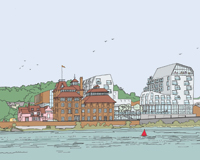During the boom years of the 2000s, the Waterfront area of Ipswich helped drive the local economy with widespread redevelopment and the attraction of marina living. But like other areas, when the credit crunch hit work virtually ground to a halt, leaving half-completed buildings and empty flats.
In recent months, however, there have been signs of recovery, with Premier Inn and Travelodge building hotels in the marina area, the relaunch of two key flat developments, proposals for a £65m Tesco foodstore in Grafton Way and the unveiling of plans for the historic Tolly Cobbold brewery site.
The latter is spearheaded by Suffolk property firm Pigeon under the executive chairmanship of former Bidwells stalwart James Buxton (see box). The plans, which have been submitted to Ipswich Borough Council, will see 68,000 sq ft of residential with 62 one- and two-bedroom flats developed in two phases, a 45,000 sq ft supermarket and a 87,000 sq ft hotel, plus space for a community facility such as a museum. The scheme would create around 400 jobs.
Buxton would not discuss investors for the £30m redevelopment of the Cliff Quay brewery site, but the firm has said that private money has been secured.
Colleague Will Stanton says: “There has been limited growth since the credit crunch, but we are seeing economic activity around the Waterfront and think this is the time to act. We have end-users wanting to take space at the site, subject to planning permission.”
Local agents are cautiously optimistic. John Spice, of Spice Property Consultants, says: “The plans look exciting, but the location is at the further end of the Waterfront, and will probably be seen as a separate location in itself.”
Pigeon is hoping the development will be completed by 2015.
Another man who is encouraged by new activity in Ipswich is Paul Isaacs, managing director of AquiGen, which is redeveloping the 44-acre former Crane Engineering site in the east of the town.
The first phase of Futura Park is due to open in November and includes a 100,000 sq ft John Lewis at Home and Waitrose stores, which have signed 25-year leases. The second phase will see 60,000 sq ft of non-food retail space, with DFS and Furniture Village rumoured to be among the first tenants.
Isaacs says: “Ipswich reminds me of the Docklands. My background is in banking, and I recall the massive surge in building. It took a few years for that supply to go down and development to restart, and that’s what happened in Ipswich. The town centre needs work, but the council seems to be addressing that.”
Spice says he is cautious about the outlook for Ipswich’s industrial and office market. He says prices for new warehouse space are around £6 to £7 per sq ft, but older stock goes as low as £1 to £1.50 per sq ft. New office space in or out of town could reach £16 to £18 per sq ft, while older stock is nearer to £5 per sq ft.
He says: “I don’t think anyone saw the depth of the property collapse in 2007 when the renaissance stalled.”
That is particularly true in the residential sector. Alex Leader at Savills is selling 80 units in the Quay and 40 in the 23-storey Mill, with the option of building another 85 units in the latter scheme. He says there has been great interest from buyers, mainly based on pricing, which starts at £70,000. “The problem in the heyday was that developers were trying to attract London buyers at London prices, combined with the downturn. We’ve looked at it more realistically.”
Buxton flies to Pigeon
After 32 years at Bidwells, including 10 as a senior partner, it is reasonable to ask why James Buxton left to join regional property company Pigeon.
“It wasn’t a mid-life crisis or anything like that,” says Buxton, 56, sitting in the Bury St Edmunds head office. “I came to a point in my life where I had choices to make: I either stayed at Bidwells and saw out the end of my career, or did something different, something more entrepreneurial – and here I am.”
He had worked with the agent since leaving the Royal Agricultural College in Cirencester in 1978, but felt the time was right to leave two years ago. “I wasn’t interested in joining another group of agents because Pigeon had some really interesting plans.”
Pigeon was started in 2008 and named after founder Richard Stanton saw a bird circling outside the restaurant. It now manages more than £100m of property investments, and has plans for more than 9,000 houses to be built over the next two to three years across the eastern region, with a further 11,000 in the pipeline.
But it is not all plain sailing for Pigeon. Proposals for a Tesco Express store, five flats worth up to £300,000 each and 17 parking spaces in the upmarket coastal town of Aldeburgh have sparked criticism from locals, worried about a clone town emerging.
Stanton says: “Not all members of the public can or want to shop in Aldeburgh, and we’ve had 200 letters of support for a Tesco Express. Not only that, but it will create around 20 jobs.”
In Thetford, Pigeon and The Crown Estate have plans for a 65,000 sq ft food store and petrol station to the north of the town. The proposals will form the first stage of the Thetford Enterprise Park. Stanton declines to say who the occupants would be, but says the firm is in discussions with “two high street” stores. He adds: “We have held consultations with the public, and 75% of those who handed in feedback forms backed the plans.”











